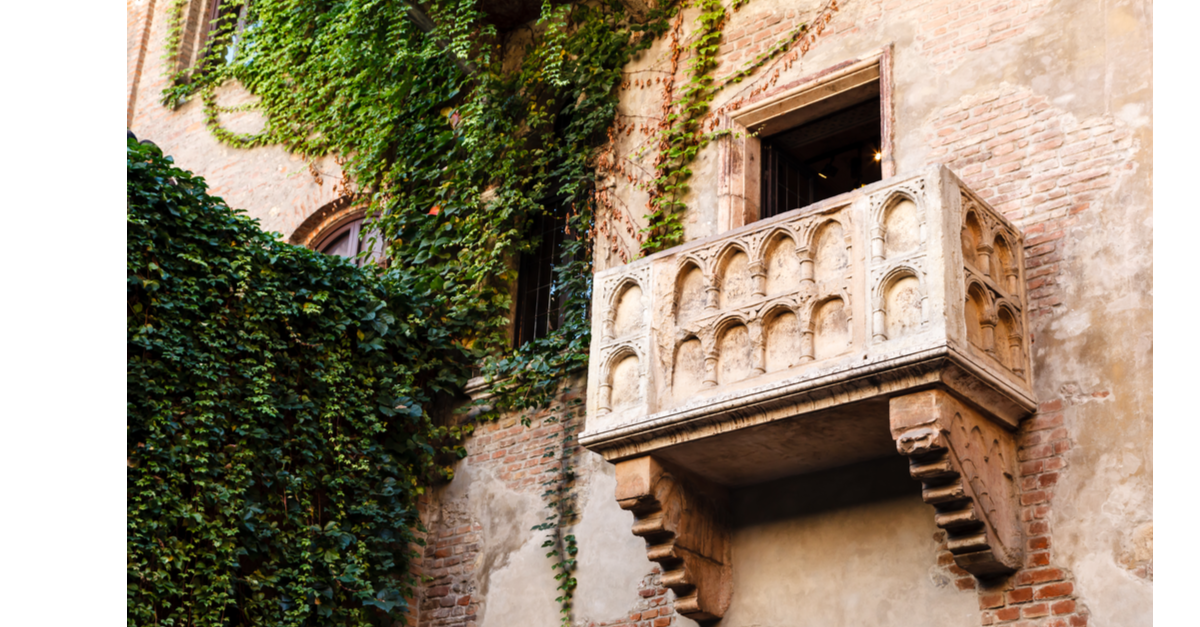
The Prologue summarizes events in Act I.
Scene 1
The next two Acts comprise complications for the lovers and the play’s turning point. The class should note that Romeo is hiding in the orchard outside Juliet’s house. Assuming Romeo still dotes on Rosaline, the irrepressible Mercutio mocks his friend’s passionate attitude to love. Giving up all hope of finding Romeo, Mercutio and Benvolio leave the Capulets’ grounds.
Scene 2
This is the celebrated balcony scene. Shakespeare gives Romeo a lengthy speech full of conventional metaphors that profess his love for Juliet. When Juliet realizes Romeo is in the orchard below her, she is immediately concerned for his safety since he is a hated Montague. Students should notice the two lovers’ different personalities: Juliet is sensible and practical. She is also modest and embarrassed that Romeo has overheard her frank words of love for him: “Thou knowest the mask of night is on my face; / Else would a maiden blush bepain my cheek / For that which thou hast heard me speak tonight….” It’s a lovely speech. As mentioned in a previous blog, an excellent assignment for students when studying Shakespearean drama is to memorize a long passage. Juliet’s speech would be an excellent choice for girls.
Disinclined to tell their feuding parents of their love, the young couple makes plans to be married by Romeo’s confidant and adviser, the Friar, although Juliet is more cautious than her ardent lover, urging him to wait. This is another reminder that Juliet is more sensible than Romeo. The Nurse’s constant interruptions emphasize the danger of discovery that the lovers face, and more ominous foreshadowing ends the scene as Juliet declares, “Yet I should kill thee with much cherishing.” Juliet intimates that her love will cause Romeo’s death.
Scene 3
Shakespeare gives Friar Laurence an excessively long speech to indicate the priest’s knowledge of herbs. Understandably shocked that Romeo has switched his affections from Rosaline to another girl whom he wants to marry, the Friar chides Romeo’s inconstancy. However, he agrees to Romeo’s request because he is foolishly reassured that marriage to Juliet may end the longstanding feud between the two families.
This is a good time to introduce an important topic: The lovers’ deaths are caused for two reasons—coincidence and human error. Scholars fault Shakespeare for emphasizing the element of coincidence or fate in this tragedy; certainly, one cannot speculate about the playwright’s reliance on mere chance that plays a fairly significant part in the tragedy. One could ask the class to start listing examples of both issues in their notebooks. The Friar’s willingness to marry the lovers is an outstanding example of human error. It’s a tragic mistake. The possible termination of the parents’ antagonism is hardly sufficient reason to withhold from them knowledge of their children’s imminent marriage. Students are unanimous in the opinion that Friar Laurence should have tried to dissuade the lovers from such a hasty marriage, and he should certainly have told the parents about their children’s wedding plans. The Friar’s acquiescing in the marriage is unwise and immoral. Students should begin to compose lists with the headings “coincidence” and “human error” and continue to record the many instances of both factors that contribute to the lovers’ deaths.
About the Author
Written by Elizabeth McCallum Marlow
I taught all aspects of the English curriculum at various colleges and private schools for 35 years. I now want to give back what I learned in the classroom about conveying to students a love for literature and a desire to write cogently. I would love to receive comments and questions that can be addressed to me at www.eamarlow0103@gmail.com.

